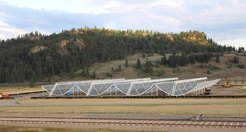Biermann Lectures 2021: Fast Radio Bursts and Magnetars
By Prof. Victoria Kaspi, McGill University in Montréal, Canada
Fast Radio Bursts are a newly recognized, mysterious phenomenon consisting of short bursts of radio waves coming from far outside our Milky Way galaxy. Their origin is presently unknown. One of the leading models for Fast Radio Bursts is that they are magnetars – young, active neutron stars having the strongest magnetic fields known in the Universe. In this year’s Biermann Lectures, Victoria Kaspi from the McGill University in Montréal, Canada, will discuss “The Case for and Against Fast Radio Bursts as Magnetars”.

As a professor of physics at McGill University, and Director of the McGill Space Institute, Victoria Kaspi’s research centres on observational studies of Fast Radio Bursts and neutron stars. She has discovered many new pulsars – rapidly rotating neutron stars – and her research has advanced our understanding of the structure of magnetars — neutron stars with an extremely powerful magnetic field.
Currently her attention has turned to Fast Radio Bursts (FRBs), and is using the novel CHIME Telescope (The Canadian Hydrogen Intensity Mapping Experiment), newly built in Penticton, British Columbia, to detect hundreds of Fast Radio Bursts. The CHIME/FRB team consists of nearly 100 students, postdocs, faculty and professionals who have developed the instrument, software pipelines and data visualization tools to take the 13 Terabit/second input CHIME data rate and search in real time for FRBs, providing near real-time FRB alerts to the worldwide community. Among CHIME/FRB's accomplishments is the discovery of dozens of repeating FRBs, the first major FRB catalog consisting of over 500 events, and the detection of a luminous radio burst from a magnetar in our own Galaxy – a demonstration that magnetars are capable of FRB-like emission.

Victoria Kaspi studied physics at McGill and Princeton, where she completed her PhD in 1993 under the supervision of Joseph Taylor (Nobel Prize in Physics 1993 for the discovery of the first binary pulsar). After postdoc positions at the California Institute of Technology, the Jet Propulsion Laboratory, and the Massachusetts Institute of Technology, she took a faculty position at McGill in 1999. Since 2015, she is Director of the McGill Space Institute. Kaspi has won many awards, including the Rutherford Medal in Physics of Royal Society of Canada in 2007, NSERC John C. Polanyi Award in 2010 and the NSERC Gerhard Herzberg Gold Medal for Science and Engineering in 2016, the Queen Elizabeth II Diamond Jubilee Medal in 2013, and this year the Shaw Prize. In 2019, she was named as one of Nature’s Top 10 People Who Mattered in Science.
In this year’s Biermann Lectures, Victoria Kaspi will discuss “The Case for and Against Fast Radio Bursts as Magnetars”. While she will introduce the terminology, basics physics, and phenomenology of magnetars and Fast Radio Bursts in her first two lectures, in her final lecture she will consider in more depth one possible FRB model, magnetars, and the evidence both for and against the association.
Overall Title
The Case for and Against Fast Radio Bursts as Magnetars
Tue, Nov 23, 15:30
Magnetars
Tue, Nov 30, 15:30
Fast Radio Bursts
Tue, Dec, 7, 15:30
The Case for and Against Fast Radio Bursts as Magnetars
Due to the COVID situation, the Biermann lectures 2021 will take place online. If you are interested in joining, please contact Maria Depner maria@MPA-Garching.MPG.DE













